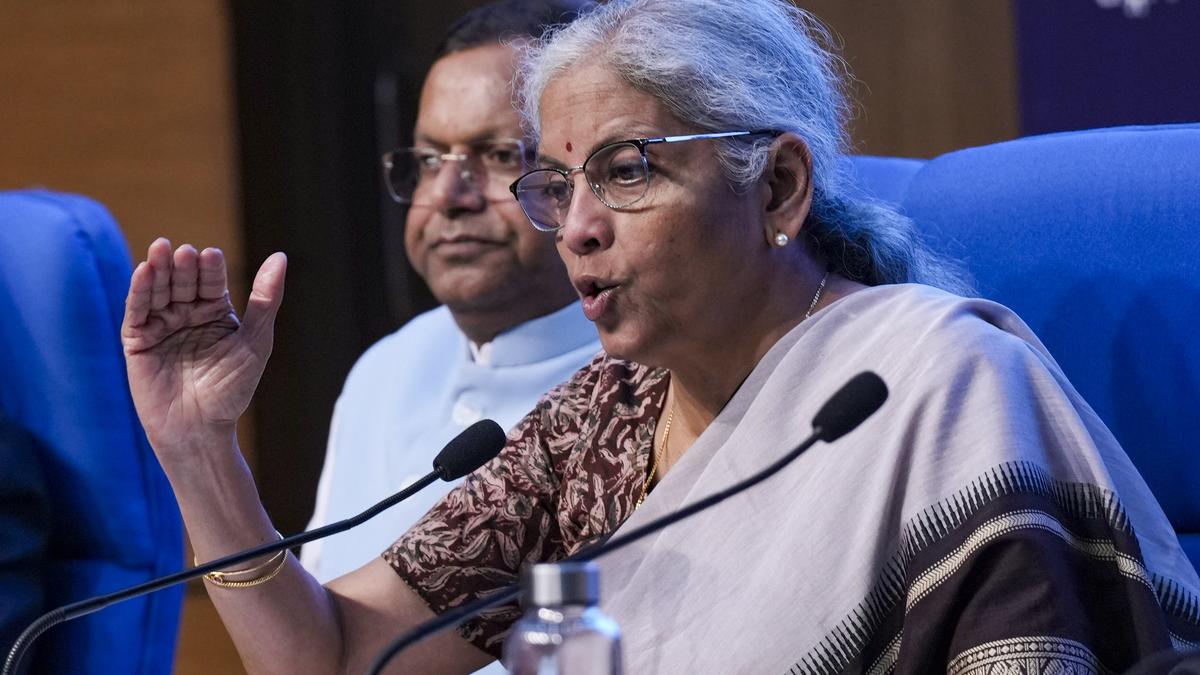Union Finance Minister Nirmala Sitharaman addresses a post-Budget press conference in New Delhi on Tuesday.
| Photo Credit: PTI
The Department of Space received an 18% hike over its expenses in 2023-2024 in the 2024-2025 Union Budget presented by Finance Minister Nirmala Sitharaman on Tuesday. The bulk of the hike goes towards the development of space technologies. The allocation increased marginally for space applications, decreased for space sciences, and almost halved for INSAT satellite systems over the budgeted amount in 2023-2024.
Since successfully concluding the Chandrayaan-3 mission in August 2023, the future road map of the Indian Space Research Organisation (ISRO) has expanded to include a new ‘next generation’ launch vehicle, more ambitious missions to the moon, and an Indian space station. ISRO is also working on its ambitious human spaceflight programme, Gaganyaan.
Mixed reactions
Importantly, Ms. Sitharaman also announced a pool of ₹1,000 crore, or around $120 million, as venture capital funding for space start-ups, with the goal of “expanding the space economy by five times in the next 10 years”. However, industry members met this announcement with mixed, even polarised, reactions.
Many called it a “pittance” and said the pool had to have been “10-100 times bigger”. Arup Dasgupta, Distinguished Professor in the Academy of Geoinformatics, Bhaskaracharya Institute of Space Applications and Geoinformatics, Gandhinagar, called the pool “a start” but added that “somewhere down the line, the government has to realise that globally governments are anchor financiers and customers”.
Susmita Mohanty, director-general of space-focused think-tank Spaceport Sarabhai, said $120 million is “how much an upstream space start-up wanting to build and launch cutting-edge space hardware needs to raise for their Series-A round”. She added that the allocation is out of step with the Finance Minister’s ambitions considering “the total funds raised in 2023-2024 by all our space start-ups combined was a paltry $134 million”.
“As an industry, we need to show some success beyond raising venture funding,” Prateep Basu, CEO of decision analytics start-up SatSure, told The Hindu. “There is not a single start-up that has crossed ₹100 crore in revenue, so the demand metrics for increasing the financial risk appetite of venture capital funding and private equity is limited today.”
Narayan Prasad, chief operations officer at satsearch, a space industry marketplace, was more optimistic about the impact of the government procuring from start-ups as an anchor customer. “The government acting as a customer is the best validation for many high-risk products to be then taken into the market,” he said.
“The government is then creating a market for competition and not picking winners based on input, which means it allows the money on the table to be looked at as an opportunity for other investors to back companies that will compete against each other to get the pie,” he added.
Mr. Basu also said the government “acting as a sponsor taking the catalytic first loss risk will cement trust in the ecosystem”.
Removing angel tax
Ms. Sitharaman also proposed removing angel tax, which space industry members hailed as less friction against new investments. In February this year, the Indian government allowed 100% automatic foreign direct investment (FDI) in satellite component manufacturing and satellite and user ground segments; up to 74% in satellite-manufacturing and operations; and up to 49% in rockets and space ports.
